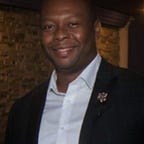Homo Sapiens Sapiens: Religion, Science and Government.
As a Christian-Catholic person who has been scientifically educated and whose Haitian culture is strongly influenced by African-rooted spiritual beliefs and practices, explaining my positions and opinions on these complex matters is often a perilous endeavor in a society where intolerance and black-or-white thinking are more accepted than the alternatives. Let me begin by saying that I truly believe in science, that I rely very much on my faith for guidance and that I see no real conflict between the two. I believe in the separation of church and state and rise against any type of religious state or government even as I accept and often welcome the fact that the laws of society and moral norms are derived from religious principles.
As I just mentioned, I see no inherent incongruity between believing in God (or a Creator, or a Greater Power) and believing in science, because I see human knowledge as coming from an all-knowing divinity and confirmed by the gift of free will afforded to all human beings. I also believe that the pursuit and the use of scientific knowledge for the advancement of humanity, for good, is the best proof of the existence and the power of God. We cannot see God and one may not believe in miracles, but we can all see and hope for the miracles that science makes possible everyday in emergency rooms around the world. Some may dismiss and minimize the wisdom of our ancestors, but health sciences keep going back to the roots (and the leaves, and the seeds), reverting to natural medicine and other practices that have been derided by those who want to rely on a skewed view of human experience to develop human knowledge. The one-sided (left-sided, right-sided) views of science have had dangerous effects on our public discourse, creating a polarization of opinions that have discouraged political leaders to agree on a set of acceptable facts. This has led to negligence, inaction and harmful decisions on matters such as public health and climate change.
Embracing science, on the one hand, is embracing all human knowledge for the benefit of all human beings. What marks our evolved humanity is not just that we know. It is knowing (believing in) that we know (science), hence our self-categorization as homo sapiens sapiens, and humbly accept the limitations and dynamic nature of that knowledge. On the other hand, believing in God is believing in everything He has created and in all the tools He has made available in the space around us and in the space in-between our two ears, perpetuated in our lifetimes and the times that we do not physically exist. Not believing in God does not, however, change the availability of the natural tools of scientific inquiry. My miracle, my mystery could be another person’s scientific questions to be answered.
When it comes to state rule, the establishment of a secular government serves all and should be celebrated by religious, atheist and agnostic people alike. The government is the de facto social judge chosen by the majority and cannot be biased towards or against either that majority or any of the other minority groups. That is supposed to be what we have come to know as democracy. Such a method of government, when applied correctly, protects all beliefs or non-belief, protects the rights of all person under the law. Many Christians like me often complain of attacks on religious liberties, but seem unaware or insensitive to the reality that their religion is systemically favored by their government and existing laws, as evidenced by the Christian prayers in state institutions, the official celebration of Christian holidays and the use of symbols such as the cross and the Bible in the shared public square.
Religions and elements of culture can be appropriated by a group or another. Religion is not fact based and is not required to represent everyone. However, science and government, are meant to be truthful, evidence-based, and must not only represent everyone but also use each other to improve lives. Science depends of government for funding, ethical guidance and the creation of an environment where truth is valued and utilized at its full potential. Government depends on science for crucial data necessary to plan, organize our society, solve problems, care for the planet and improve quality of life. Science and government must be free of religious influence because they represent common ground and the source of common aspirations. Whereas salvation (religion) is personal, science and government are for each and for all.
